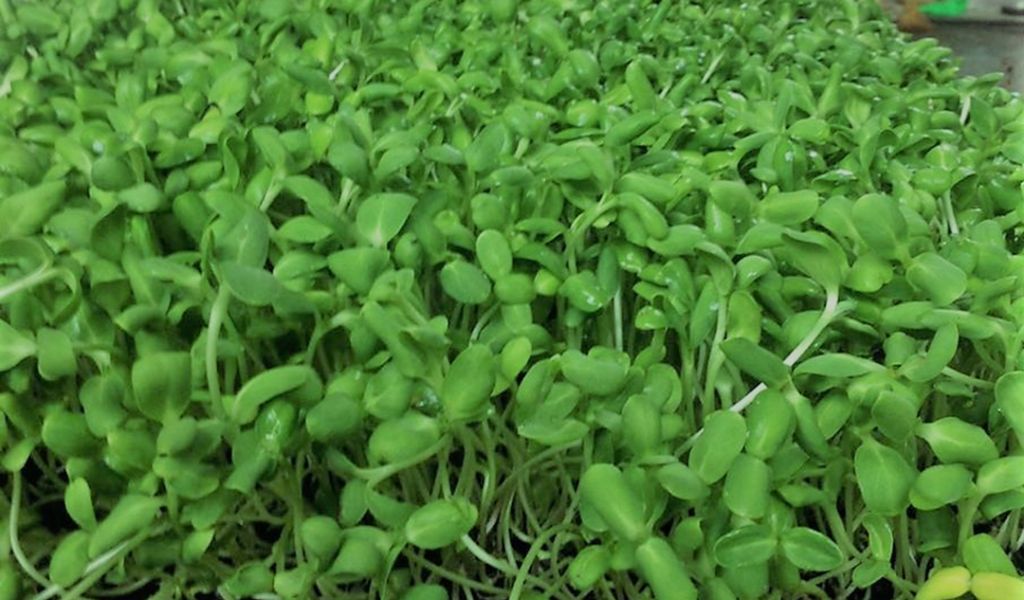How to start a Sunflower sprout business

We talked with Mrs. Khamhou Sengdavaong, a government officer at Ministry of Agriculture and Forestry. She enjoys growing sunflower sprouts in her free time.
1. How did you get the idea to start growing sunflower sprouts for business?
I learned about the sunflower sprout business from my husband’s friend when we went to visit him. He grows many kinds of vegetables, including sunflower sprouts. The sprouts immediate-ly caught my eye and I thought to myself, “This is something we could do at our house too”. I was attracted to the sprouts because I knew they are easy to grow and frankly, I just happen to love sprouts!
We started small. At first, we grew sprouts only for our family, cousins, and friends. We then learned that there were other people too who wanted to buy our sprouts because we don’t use any chemicals. We’ve now been doing this as a business for almost a year.
2. What is growing sunflower sprouts like on a day-to-day basis?
Growing sunflower sprouts is similar to growing other organic vegetables. We mix natural fer-tilizer in the soil and then plant the sunflower seeds. The growing cycle is 7 days from planting to harvest.
One of us spends 1-2 hours per day taking care of the sprouts. The main thing is to water them and to keep an eye out for pests that might damage them. In our family we take turns helping each other out because this is a side business for us, something we do in addition to our full-time jobs.
3. What does one need to do to start a sunflower sprout business?
It is not difficult to start growing sunflower sprouts. Here’s what you do:
- Soak the seeds in water overnight and then cover them with a cotton cloth for 12 hours.
- After that, sprinkle the seeds on to the planting trays and water them.
- Let the seeds rest and don’t water them for 1-2 days.
- Then water the sprouts twice a day (morning and evening) for 5 days.
- After that, the sprouts are ready to be harvested and eaten or sold.
Tips:
- Placing the planting trays outdoors in a sunny spot makes the sprouts grow better.
- Remember to water them often enough.
- Plant sprout trays in a rotational manner so that the trays are at different stages of growth.
- You can recycle the soil by mixing in natural fertilizer every time you plant a new tray.
4. How much does it typically cost to get started?
The startup cost for us was about 600,000 Kip
- Planting trays are about 20,000 Kip per tray
- Planting shelves are 200,000 Kip per shelf.
- Seeds are 45,000 Kip/kg
- Soil is about 10,000 Kip/bag
5. How much income do you earn from this activity?
Each tray produces 0.8-1kg of sprouts every 7 days and we get 25-30,000 Kip per kg. These days, on average, we produce about 6 kg per day, and in a month we can earn around 5 million kip.
6. What are the biggest challenges in farming sunflower sprouts?
Lately, a lot more people have started to grow sunflower sprouts. That means we have more competition and sometimes we are uncertain about the current market price. We need to have a solid marketing strategy and the more we have loyal customers the better. Moreover, during the rainy season, it’s harder to grow sprouts. Sometimes we need to plant more seeds to fill the trays, which increases our costs.
7. What’s the best thing about growing sunflower sprouts?
Sprouts are a great side business. Growing them is easy and they make my garden look greener and more attractive. And we can both eat them ourselves and earn extra money.
Growing sprouts is also great because almost everyone, young and old, likes them. There are endless ways to use them; you can use them in salads, fried rice, spaghetti, you name it! We’ve also noticed that consumers are getting more interested in organic food and therefore there’s been an increase in demand.
